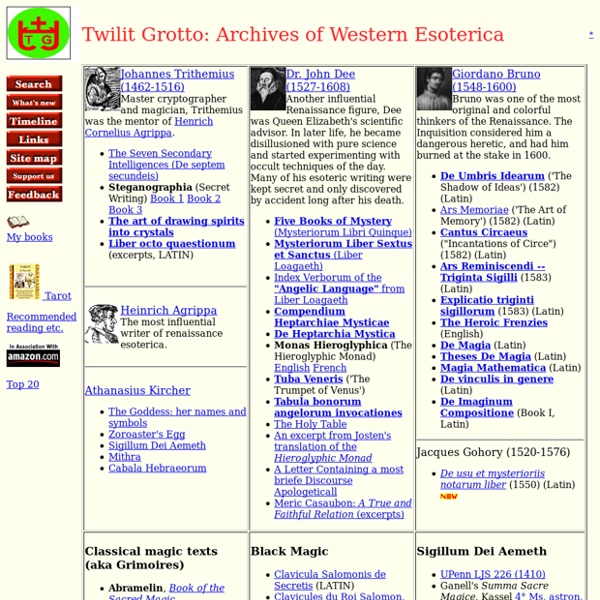



http://www.esotericarchives.com/esoteric.htm
Related: Spiritual Anarchy • old language and texts • LibrariesThe Real Meaning of Egregore The word "Egregore" derives from the Greek word egrégoroi, meaning "watchers," which also transliterates as "Grigori." The word appears in the Septuagint translation of the Book of Lamentations, as well as the Book of Jubilees and the Book of Enoch. Even being derived from the word Grigori, which acquired a somewhat negative aspectation over the time, the general concept of Egregore is not evil. Gaetan Delaforge, in Gnosis Magazine in 1987, defines an Egregore as a kind of group mind which is created when people consciously come together for a common purpose. When a group of people pray and meditate collectively towards an objective, an Egregore of protection and blessing is sent forth, as a circle of Light that shields and safeguards the purpose of the prayers.
Liber Juratus Honorii, or the Sworn Book of Honorius This done, in the middle of the circles, namely in the center, make a pentagram thus: in the middle of which should be the sign 'Tau', thus: , and above that sign, write the name of God El, and underneath this another name of God, namely, Ely, in this fashion: Then, below the uppermost angle of the pentagram, write these two letters: .l.x. And below the other in the right angle, these two: .a.l. Early Church Fathers - Additional Works in English Translation unavailable elsewhere online Early Church Fathers - Additional Texts Edited by Roger Pearse These English translations are all out of copyright, but were not included in the 38 volume collection of Ante-Nicene, Nicene and Post-Nicene Fathers.
Hebrews And Vedic Brahmins Dr. Samar Abbas, Aligarh, India EDITORIAL, Jul 14 (VNN) A Review In 1979 the Oriental Institute at Baroda published a paper entitled "The Hebrews belong to a branch of Vedic Aryans." This was a follow-up to a previous article on the same topic published by the same author, Prof. Madan Mohan Shukla, in the Vishveshvaranand Indological Journal in 1976. Books and Titles Art | Economics | History | Law | Literature | Music | Philosophy | Political Theory | Religion | Science | Sociology | War and Peace Alphabetical List of all Titles | Liberty Fund Books online These are places to go to if you are looking for books, articles, pamphlets, audio, and other titles:
ENUMA ELISH Sacred-Texts Ancient Near East ENUMA ELISH THE EPIC OF CREATION L.W. King Translator (from The Seven Tablets of Creation, London 1902) A more complete etext of the Seven Tablets of Creation is also available here. Gutenberg On August 26 2020, the Project Gutenberg website underwent some major changes. These changes had been previewed since early 2020, and visitors to the old site were invited to try the new site, including giving input via a brief survey. The old site is no longer available. If you found yourself on this page unexpectedly, it is because an old page was redirected here. Please use the navigation menus at the top of the page to find what you were looking for.
Arnold Krumm-Heller Heinrich Arnold Krumm-Heller (15 April 1876 – 19 April 1949) was a German doctor, occultist, Rosicrucian, and founder of Fraternitas Rosicruciana Antiqua (FRA), a traditional Hermetic order that operates in Brazil. He also was a German naval intelligence agent during the Mexican Revolution and World War I. A prolific writer, he published 25 esoteric books, novellas, history books, biographies, as well as countless articles in his magazine Rosa Cruz and similar publications.
8 Ancient Writing Systems That Haven't Been Deciphered Yet The Indus Valley civilization was one of the most advanced in the world for more than 500 years, with more than a thousand settlements sprawling across 250,000 square miles of what is now Pakistan and northwest India from 2600 BCE to 1900 BCE. It had several large, well-planned cities like Mohenjo-daro, common iconography—and a script no one has been able to understand. Over at Nature, Andrew Robinson looks at the reasons why the Indus Valley script has been so difficult to crack, and details some recent attempts to decipher it.
Gnostic Society Library: Sources on Gnosticism and Gnosis Almost all of the several dozen internet sites with collections of texts similar to our own obtained their material by directly or indirectly copying some files present at the Gnosis Archive. Ours was perhaps the first major collection of such texts to appear on "the web" in 1994, and thus has served as a source for others creating "their own" collections. Unfortunately transcription errors, typos, and primitive HTML formatting were present in the massive amount of material added to the Gnosis Archive in our first years; in a repeated process of "copying" they have been very widely propagated around the internet. Over nearly two decades we have made many corrections to these texts. It appears that few of the sites copying material from this collection have taken the time to read, edit and correct the texts! This is of course exactly how the manuscript tradition has propagated errors in the past centuries, though with vastly different technologies of reproduction.